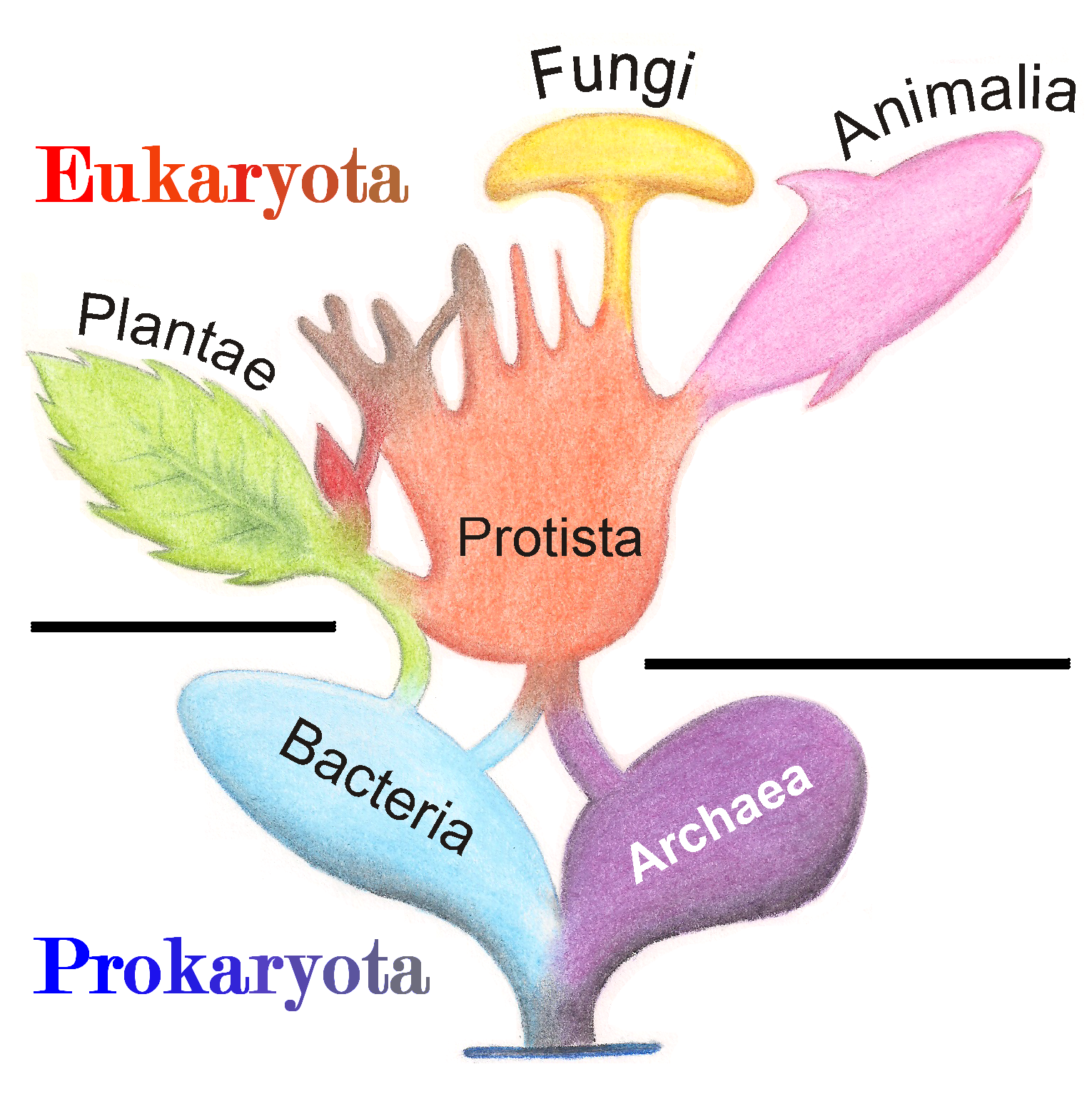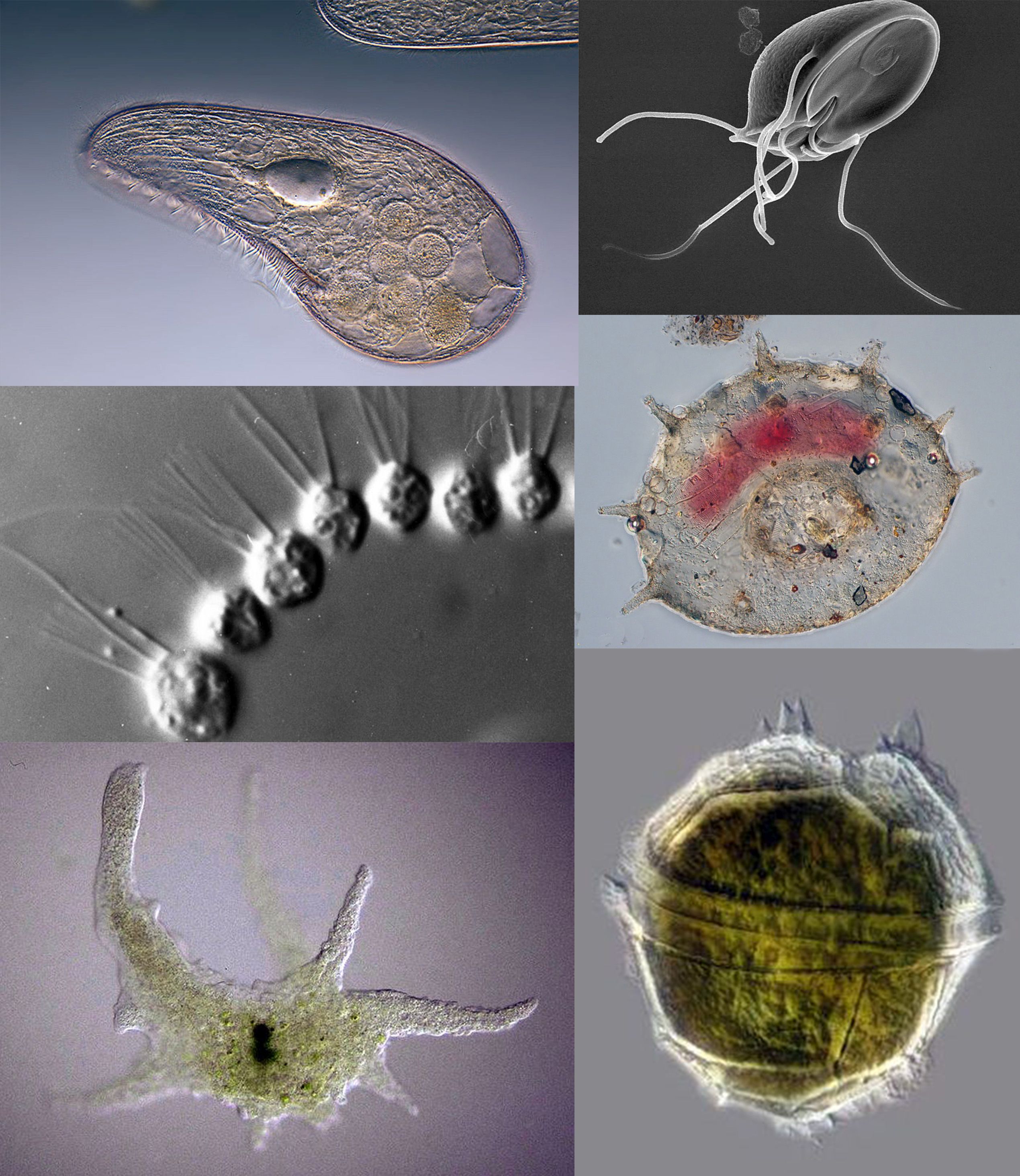|
Protistology
Protistology is a scientific discipline devoted to the study of protists, a highly diverse group of eukaryotic organisms. All eukaryotes apart from animals, plants and fungi are considered protists. Its field of study therefore overlaps with the more traditional disciplines of phycology, mycology, and protozoology, just as protists embrace mostly unicellular organisms described as algae, some organisms regarded previously as primitive fungi, and protozoa ("animal" motile protists lacking chloroplasts). They are a paraphyletic group with very diverse morphologies and lifestyles. Their sizes range from unicellular picoeukaryotes only a few micrometres in diameter to multicellular marine algae several metres long. History The term "protozoology" has become dated as understanding of the evolutionary relationships of the eukaryotes has improved, and is frequently replaced by the term "protistology". For example, the Society of Protozoologists, founded in 1947, was renamed Internatio ... [...More Info...] [...Related Items...] OR: [Wikipedia] [Google] [Baidu] |
European Journal Of Protistology
''The European Journal of Protistology'' is a medical journal that covers the entire scope of protistology, from their development and ecology to molecular biology. The journal is published by Elsevier. It is official journal of the Federation of European Protistological Societies. Abstracting and indexing The journal is abstracted and indexed for example in: * Web of Science * Elsevier Biobase, Elsevier BIOBASE According to the ''Journal Citation Reports'', the journal has a 2021 impact factor of 3.471. References External links * Biology in Europe Biology journals English-language journals Elsevier academic journals {{biology-journal-stub ... [...More Info...] [...Related Items...] OR: [Wikipedia] [Google] [Baidu] |
Protists
A protist () is any eukaryotic organism (that is, an organism whose cells contain a cell nucleus) that is not an animal, plant, or fungus. While it is likely that protists share a common ancestor (the last eukaryotic common ancestor), the exclusion of other eukaryotes means that protists do not form a natural group, or clade. Therefore, some protists may be more closely related to animals, plants, or fungi than they are to other protists. However, like the groups ''algae'', ''invertebrates'', and ''protozoans'', the biological category ''protist'' is used for convenience. Others classify any unicellular eukaryotic microorganism as a protist. The study of protists is termed protistology. History The classification of a third kingdom separate from animals and plants was first proposed by John Hogg in 1860 as the kingdom Protoctista; in 1866 Ernst Haeckel also proposed a third kingdom Protista as "the kingdom of primitive forms". Originally these also included prokaryotes, but ... [...More Info...] [...Related Items...] OR: [Wikipedia] [Google] [Baidu] |
Microorganism
A microorganism, or microbe,, ''mikros'', "small") and ''organism'' from the el, ὀργανισμός, ''organismós'', "organism"). It is usually written as a single word but is sometimes hyphenated (''micro-organism''), especially in older texts. The informal synonym ''microbe'' () comes from μικρός, mikrós, "small" and βίος, bíos, "life". is an organism of microscopic size, which may exist in its single-celled form or as a colony of cells. The possible existence of unseen microbial life was suspected from ancient times, such as in Jain scriptures from sixth century BC India. The scientific study of microorganisms began with their observation under the microscope in the 1670s by Anton van Leeuwenhoek. In the 1850s, Louis Pasteur found that microorganisms caused food spoilage, debunking the theory of spontaneous generation. In the 1880s, Robert Koch discovered that microorganisms caused the diseases tuberculosis, cholera, diphtheria, and anthrax. Because mi ... [...More Info...] [...Related Items...] OR: [Wikipedia] [Google] [Baidu] |
Protozoa
Protozoa (singular: protozoan or protozoon; alternative plural: protozoans) are a group of single-celled eukaryotes, either free-living or parasitic, that feed on organic matter such as other microorganisms or organic tissues and debris. Historically, protozoans were regarded as "one-celled animals", because they often possess animal-like behaviours, such as motility and predation, and lack a cell wall, as found in plants and many algae. When first introduced by Georg Goldfuss (originally spelled Goldfuß) in 1818, the taxon Protozoa was erected as a class within the Animalia, with the word 'protozoa' meaning "first animals". In later classification schemes it was elevated to a variety of higher ranks, including phylum, subkingdom and kingdom, and sometimes included within Protoctista or Protista. The approach of classifying Protozoa within the context of Animalia was widespread in the 19th and early 20th century, but not universal. By the 1970s, it became usual to require th ... [...More Info...] [...Related Items...] OR: [Wikipedia] [Google] [Baidu] |
Journal Of Microscopy
The ''Journal of Microscopy'' is the monthly peer-reviewed scientific journal of the Royal Microscopical Society which covers all aspects of microscopy including spatially resolved spectroscopy, compositional mapping, and image analysis. This includes technology and applications in physics, chemistry, material science, and the life sciences. It is published by Wiley-Blackwell on behalf of the Society. The editor-in-chief is Michelle Peckham, a Cell Biology professor at University of Leeds. The journal publishes review articles, original research papers, short communications, and letters to the editor. It was established in 1841 as the ''Transactions of the Microscopical Society of London'', obtaining its current name in 1869, with volume numbering restarting at 1. Abstracting and indexing The journals is abstracted and indexed in: According to the ''Journal Citation Reports'', the journal has a 2020 impact factor The impact factor (IF) or journal impact factor (JIF) ... [...More Info...] [...Related Items...] OR: [Wikipedia] [Google] [Baidu] |
Transactions Of The Microscopical Society
The ''Journal of Microscopy'' is the monthly peer-reviewed scientific journal of the Royal Microscopical Society which covers all aspects of microscopy including spatially resolved spectroscopy, compositional mapping, and image analysis. This includes technology and applications in physics, chemistry, material science, and the life sciences. It is published by Wiley-Blackwell on behalf of the Society. The editor-in-chief is Michelle Peckham, a Cell Biology professor at University of Leeds. The journal publishes review articles, original research papers, short communications, and letters to the editor. It was established in 1841 as the ''Transactions of the Microscopical Society of London'', obtaining its current name in 1869, with volume numbering restarting at 1. Abstracting and indexing The journals is abstracted and indexed in: According to the ''Journal Citation Reports'', the journal has a 2020 impact factor The impact factor (IF) or journal impact factor (JIF) of an ... [...More Info...] [...Related Items...] OR: [Wikipedia] [Google] [Baidu] |
Archiv Für Mikroskopische Anatomie
Max Johann Sigismund Schultze (25 March 1825 – 16 January 1874) was a German microscopic anatomist noted for his work on cell theory. Biography Schultze was born in Freiburg im Breisgau (Baden). He studied medicine at Greifswald and Berlin, and was appointed an associate professor of anatomy at Halle in 1854. Five years later he became a full professor of anatomy and histology and director of the Anatomical Institute at the University of Bonn. He died in Bonn on 16 January 1874; his successor at the anatomical institute being Adolph von La Valette-St. George. He was the older brother of obstetrician Bernhard Sigmund Schultze (1827–1919). He founded, in 1865, and edited the important "''Archiv für mikroskopische Anatomie''", to which he contributed many papers, and he advanced the subject generally, by refining on its technical methods. His works included: *''Beiträge zur Naturgeschichte der Turbellarien'' (1851). *''Uber den Organismus der Polythalamien'' (1854). *''Beitr ... [...More Info...] [...Related Items...] OR: [Wikipedia] [Google] [Baidu] |
Journal Of Cell Science
The ''Journal of Cell Science'' (formerly the ''Quarterly Journal of Microscopical Science'') is a peer-reviewed scientific journal in the field of cell biology. The journal is published by The Company of Biologists. The journal is partnered with Publons, is part of the Review Commons initiative and has two-way integration with bioRxiv. ''Journal of Cell Science'' is a hybrid journal and publishes 24 issues a year. Content over 6 months old is free to read. History Foundation and early years The journal was established in 1853 as the ''Quarterly Journal of Microscopical Science'' (''Q. J. Microsc. Sci.'', ). The founding editors were Edwin Lankester and George Busk.''Quarterly Journal of Microscopical Science'' 1(1), front matter (accessed 18 April 2008) ... [...More Info...] [...Related Items...] OR: [Wikipedia] [Google] [Baidu] |
Quarterly Journal Of Microscopical Science
The ''Journal of Cell Science'' (formerly the ''Quarterly Journal of Microscopical Science'') is a peer-reviewed scientific journal in the field of cell biology. The journal is published by The Company of Biologists. The journal is partnered with Publons, is part of the Review Commons initiative and has two-way integration with bioRxiv. ''Journal of Cell Science'' is a hybrid journal and publishes 24 issues a year. Content over 6 months old is free to read. History Foundation and early years The journal was established in 1853 as the ''Quarterly Journal of Microscopical Science'' (''Q. J. Microsc. Sci.'', ). The founding editors were Edwin Lankester and George Busk.''Quarterly Journal of Microscopical Science'' 1(1), front matter (accessed 18 April 2008) ... [...More Info...] [...Related Items...] OR: [Wikipedia] [Google] [Baidu] |
J-STAGE
J-STAGE (Japan Science Technology Information Aggregator, Electronic) is an electronic journal platform for Japanese academic journals, administered by the Japan Science and Technology Agency (JST). It “supports the submission of manuscripts, peer‐reviewing, page‐layouting and dissemination of electronic journals” published in Japan. The site provides free access to full text electronic journals, proceedings, and reports from various Japanese scientific societies. It includes the Journal@rchive, an open access digital archive of Japanese journals, established in FY 2005 by the Government of Japan. By April 2009, some 540 academic organizations made use of the facility. As of February 2012, 1.68 million articles were available for download. To build the archive, in 2006 a robotic book scanner was introduced that could scan 1,200 pages per hour. See also * CiNii CiNii () is a bibliographic database service for material in Japanese academic libraries, especially focusing ... [...More Info...] [...Related Items...] OR: [Wikipedia] [Google] [Baidu] |
Journal Of Protistology
A journal, from the Old French ''journal'' (meaning "daily"), may refer to: *Bullet journal, a method of personal organization *Diary, a record of what happened over the course of a day or other period *Daybook, also known as a general journal, a daily record of financial transactions *Logbook, a record of events important to the operation of a vehicle, facility, or otherwise *Record (other) *Transaction log, a chronological record of data processing *Travel journal In publishing, ''journal'' can refer to various periodicals or serials: *Academic journal, an academic or scholarly periodical **Scientific journal, an academic journal focusing on science **Medical journal, an academic journal focusing on medicine **Law review, a professional journal focusing on legal interpretation *Magazine, non-academic or scholarly periodicals in general **Trade magazine, a magazine of interest to those of a particular profession or trade **Literary magazine, a magazine devoted to literat ... [...More Info...] [...Related Items...] OR: [Wikipedia] [Google] [Baidu] |


